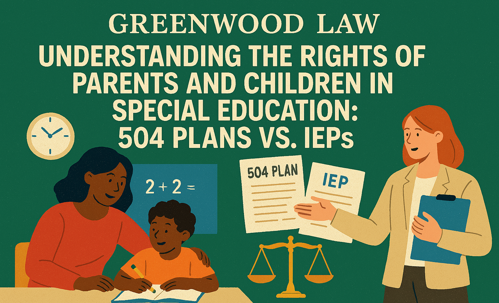Join us September 13, 2025 at 9 EST.
Click here to sign up for the live webinar.
Navigating the world of special education can be overwhelming for families. At Greenwood Law, we believe that informed parents are empowered advocates. That’s why we’re proud to present a comprehensive session led by attorneys James D Greenwood and Steph C Iasiello on the rights of parents and children in special education settings—specifically focusing on the creation and differences between 504 Plans and Individualized Education Programs (IEPs).
What Are 504 Plans and IEPs?
Both 504 Plans and IEPs are designed to support students with disabilities, but they arise from different laws and serve different purposes.
504 Plans are governed by Section 504 of the Rehabilitation Act of 1973. They provide accommodations that help students access the general education curriculum—such as extended time on tests, modified assignments, or assistive technology. Eligibility requires a physical or mental impairment that substantially limits one or more major life activities.
IEPs, on the other hand, are governed by the Individuals with Disabilities Education Act (IDEA). They offer specialized instruction and services tailored to a student’s unique educational needs. To qualify, a student must fall under one of 13 disability categories defined by IDEA and require special education.
Why the Distinction Matters
Understanding the difference between these plans is crucial for parents advocating for their child’s educational rights. While both aim to remove barriers, the legal protections, eligibility criteria, and scope of services differ significantly. For example, an IEP may include speech therapy or occupational therapy, while a 504 Plan might simply adjust classroom seating or testing conditions.
What Parents Should Know
- Timelines Are Tight: Special education proceedings often move quickly. Missing deadlines can mean losing the opportunity to appeal or revise a plan.
- Collaboration Is Key: Both plans require input from parents, educators, and school staff. Open communication and documentation are essential.
- Legal Support Can Help: If you’ve been denied a plan, are unsure about your child’s eligibility, or need help navigating school communications, Greenwood Law is here to assist.
Join Us for the Presentation
This presentation will walk attendees through:- The legal foundations of 504 Plans and IEPs
- How to determine which plan fits your child’s needs
- Real-world examples and case studies
- Tips for effective advocacy and collaboration with schools

